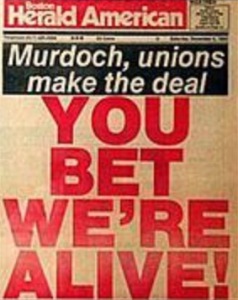
Chris Sweeney has written a sharp piece for Boston magazine on the state of the Boston Herald, the city’s number-two daily. As is generally the case with stories about the Herald, the overarching theme is: How much longer can the struggling tabloid cling to life?
And yet I wonder if that’s the right question. For a decade starting in the mid-1990s, I covered the Herald‘s ups and downs as the media columnist for the Boston Phoenix. If I had a dime for every person who told me the Herald had six months to live, I’d be a very rich man. Sadly, it was the Phoenix that didn’t survive.
As Sweeney notes, the Herald these days seems more like an extension of its online radio station than a standalone newspaper. Nearly two years ago editor Joe Sciacca gave me a tour of the paper’s new headquarters in South Boston, and I was impressed with what I saw—especially the amount of space devoted to multimedia and to the modern radio facilities.
My WGBH colleague Jim Braude tells Sweeney that not many people may be listening to Boston Herald Radio (OK, Braude’s actual quote is “I don’t think anyone listens”). But Braude also points out that it’s given the Herald a jolt of relevance in terms of high-profile guests like Mayor Marty Walsh, Governor Charlie Baker, and Donald Trump, whose appearances can then be written up and tweeted out.
Unfortunately, none of the top three executives at the Herald would speak with Sweeney, a group that comprises publisher Pat Purcell, Sciacca, and executive editor John Strahinich. It would have been useful to get some insights from them regarding the Herald‘s current business model. Not that I’m faulting Sweeney—I’ve been there. And his description of trying to get Strahinich to talk is pretty amusing.
But even though print circulation has shrunk precipitously and print advertising revenue is presumably scarce, the Herald does have some strengths. Sweeney does not report the size of the staff, but it’s small and therefore affordable. The sports section is very good. The website is slow and frustrating, but the third-party mobile app is excellent—and includes one-click access to Herald Radio. Purcell made a lot of money selling off the old headquarters in the South End; the Herald is now printed by the Boston Globe, which means that its larger competitor has every reason to keep its rival breathing.
So how long can the Herald survive? Keep those dimes rolling in.
Discover more from Media Nation
Subscribe to get the latest posts sent to your email.
Professor Kennedy –
Thank you for writing this. I wouldn’t have seen the original article.
The question for me is not “how long can the Herald keep printing” but “at what point does the Herald no longer command a meaningful amount of political and cultural influence in Greater Boston?” So I’m a Brighton Republican who would never read the Herald or listen to Herald Radio. I find it irrelevant to me as an upper-middle-income moderate, Charlie-Baker Republican.
Expanding on that, as Boston itself changes, and the culture is no longer as driven as it was by the culture of the working class, the Herald’s style will matter less and less. Computer programmers like me are more likely to define the culture now in this city than construction workers. (No slight there, my dad was one of them.)
I think it’s more likely that the New Boston Post (currently finding its footing while growing) will pick up right-leaning readers who are more educated and better represent the future of our city. They can at least appeal to new Bostonians like me, where the Herald cannot.
As a journalist, a two-newspaper town, plus other weekly and monthly publications, make it more fun, interesting and competitive for reporters covering the same or overlapping beats. It’s better to wake up in the morning (or now also the late evening) and see what your competition has written. More people benefit, namely readers, because a greater amount of news is covered, and with different news views and visual presentations to accompany an article or web update. May the Herald continue publishing.